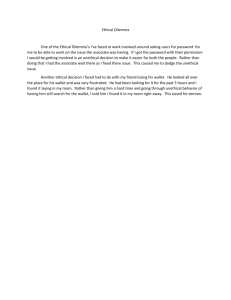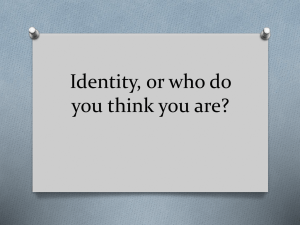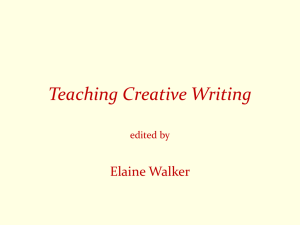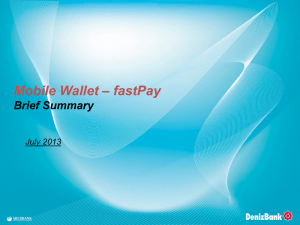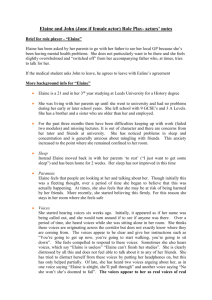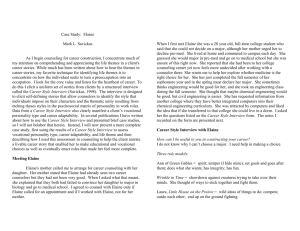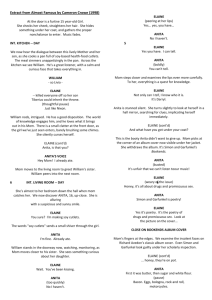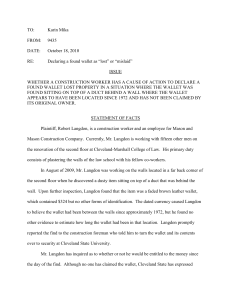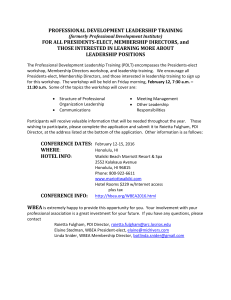File
advertisement
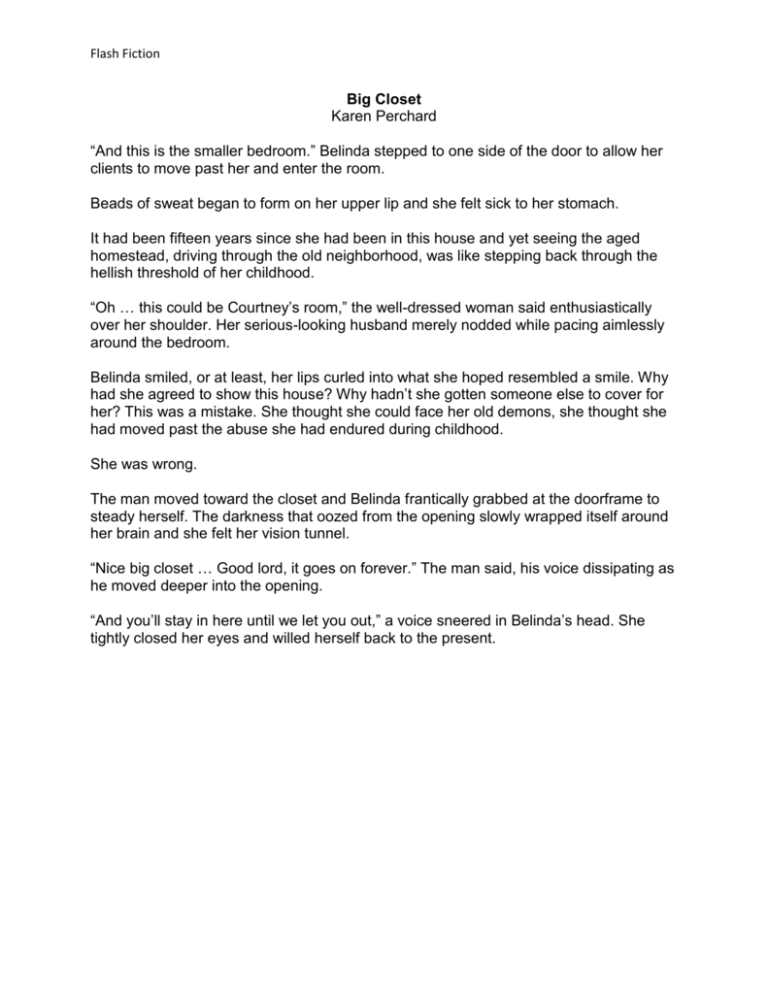
Flash Fiction Big Closet Karen Perchard “And this is the smaller bedroom.” Belinda stepped to one side of the door to allow her clients to move past her and enter the room. Beads of sweat began to form on her upper lip and she felt sick to her stomach. It had been fifteen years since she had been in this house and yet seeing the aged homestead, driving through the old neighborhood, was like stepping back through the hellish threshold of her childhood. “Oh … this could be Courtney’s room,” the well-dressed woman said enthusiastically over her shoulder. Her serious-looking husband merely nodded while pacing aimlessly around the bedroom. Belinda smiled, or at least, her lips curled into what she hoped resembled a smile. Why had she agreed to show this house? Why hadn’t she gotten someone else to cover for her? This was a mistake. She thought she could face her old demons, she thought she had moved past the abuse she had endured during childhood. She was wrong. The man moved toward the closet and Belinda frantically grabbed at the doorframe to steady herself. The darkness that oozed from the opening slowly wrapped itself around her brain and she felt her vision tunnel. “Nice big closet … Good lord, it goes on forever.” The man said, his voice dissipating as he moved deeper into the opening. “And you’ll stay in here until we let you out,” a voice sneered in Belinda’s head. She tightly closed her eyes and willed herself back to the present. Flash Fiction 21 Jim Crace A youngish man, a trifle overweight, too anxious for his age, completed his circuit of the supermarket shelves and cabinets and stood in line, ashamed as usual. He arranged his purchases on the checkout belt and waited, with his eyes fixed on the street beyond the shop window, while the woman at the till scanned all the bar codes on his medicines, his vitamins, his air freshener, his toilet tissue, his frozen Meals for One, his tins, his magazines, his beer, and his deodorant, his bread, bananas, milk, his fatfree yogurt, his jar of decaf, and his treats: today, some roasted chicken legs, some grapes, a block of chocolate, and two croissants. He rubbed his thumb along the embossed numbers of his credit card while each item triggered a trill of recognition from the till. The till's computer recognized the young man's Distinctive Shopping Fingerprint as well, the usual ratio of fat to starch, the familiar selection of canned food, the recent and increasing range of health supplements, the unique combination of monthly magazines. The pattern of the shopping identified the customer. Even before the woman at the till had swiped the credit card, the computer had lined up the young man's details-his list of purchases for the previous seven months, his credit rating, his Customer Loyalty score. It knew broadly who he was and how he lived. It could deduce what his modest rooms above the travel shop were like, how stale they were, how flowerless, how functional, how crying out for change. Here was the man whose cat had died or run away three months ago. No cat food purchased since that time. Here was the customer who had not left the neighborhood for more than seven days in living, byte-sized memory. Last spring, he'd tried-and failed-to cut down on patisseries and sugar. Today, for once, he had resisted his usual impulse purchase of a packet of cheroots. Computer screened a message on the woman's till: Cheroots ... Cheroots ... it said. Remind the customer he has not purchased cereals or cheese or vegetables this month. Remind him of our special offers: 12 cans of lager for the price of 10. Buy one bottle of our Boulevard liqueur and get a second free. Remind him that time is passing more quickly than he thinks-his washing powder should be used by now. He must need basics, such as rice and pasta, soap, toothpaste, flour, oil, and condiments. Inform him of our Retail Schemes and that we open now on Sunday afternoons. Advise him that he ought to do more cooking for himself. He ought to tidy up and clean the bathroom tiles with our new lemon whitener. He ought to start afresh. Suggest to him he tour our shelves again. At once. For what we choose is what we are. He should not miss this second opportunity to re-create himself with food. Flash Fiction The Wallet Andrew McCuaig When Elaine arrived at work the first thing she noticed was that Troy had left his wallet on the small shelf next to a half-finished cup of Coke. Troy left his food regularly, as if she were his maid, but he left his wallet less often -about once a month. The first time it happened was just her second night on the job, and she thought maybe he was testing her honesty, or, worse,- that he had created some excuse to come back and see her. He had, in fact, returned half an hour later and deliberately rubbed his body up against hers as he retrieved his wallet instead of just standing at the door and asking her to hand it to him. They had made awkward small talk in the cramped booth before he finally raised his wallet in a salute, said good-bye and good luck and rubbed past her again. Now, as she settled onto the stool for her shift, she could smell his lingering presence. Sloe picked up the cup of Coke and placed it in the garbage can at her feet, careful to keep it upright. The cup had sweated out a puddle in the summer heat and she shook her head despairingly. She lined up her piles of quarters and dimes on the shelf in order to have something to do. Two booths down, Jose waved at her and gave her two thumbs up, a gesture he thought was cute. He was another lecherous type, always spending his breaks standing at her door looking her up and down and blowing smoke into her booth. She waved at him so he'd turn around. In front of her now the highway was black. Every few minutes headlights would appear in the distance like slow trains but most of the time the drivers would pick the automatic lanes. Then three or four cars might come in a row and she'd be grateful to move into a rhythm-reach, grab, turn, gather, turn, reach, good night. It was annoying when people didn't bring their cars close enough, but at least it allowed her to stretch more. By midnight she had made change for twenty-six people. Several weeks ago she had started to keep track out of boredom. Her midnight record was seventy-two, her fewest, twelve. At about three o'clock a car came toward her too fast, weaving like a firefly, before picking her booth. The brakes screeched, the muffler roared: it was a little yellow Chevette, an eighties car pocked with rust. Elaine leaned forward with her hand ready, but the driver, a young woman, made no move to pay her toll. She looked straight ahead, her face hidden by strings of brown hair, both hands locked tight to the wheel. Beside her in the front seat was a small beat-up suitcase overflowing with clothes. Elaine said, "Good morning," and the woman said, " I need money. " Elaine hesitated. "You mean you don't have the toll?" "No, I mean I need money." She turned now and Elaine saw bleary eyes and splotched face. There was an ugly gash below one eye and the skin around it had swollen up and Flash Fiction turned purple. There seemed to be an older scar on her nose, and dried blood in the corner of her mouth. Her stare was bitter and bold and it made Elaine look away. She was about to raise the bar and tell her to go on ahead when she saw movement in the backseat. Looking closer, she saw there were two children, one about five, the other barely two, neither in car seats or seatbelts. Their eyes were wide and afraid and Elaine realized it was this that had drawn her attention to them in the dark. The little one held on to a gray stuffed animal, the older one was sucking her thumb. Jose was watching her; he raised his palms and scowled. She had been trained to signal in a certain way if she was being held up, and Jose seemed to be waiting for this gesture. Instead, she gave him a thumbs up and surreptitiously reached for Troy's wallet. She opened the wallet to find ninety-two dollars inside. She pulled these bills out, wadded them in her fist and reached out to the woman, who took the money, gripped the wheel harder and sped away. The older girl's face, framed by the back window, receded into the darkness, her eyes like glowing stones. Flash Fiction Accident Dave Eggers You all get out of your cars. You are alone in yours, and there are three teenagers in theirs, an older Camaro in new condition. The accident was your fault, and you walk over to tell them this. Walking over to their car, which you have ruined, it occurs to you that if the three teenagers are angry teenagers, this encounter could be very unpleasant. You pulled into an intersection, obstructing them, and their car hit yours. They have every right to be upset, or livid, or even violence-contemplating. As you approach, you see that their driver's side door won't open. The driver pushes against it, and you are reminded of scenes where drivers are stuck in submerged cars. Soon they all exit through the passenger side door and walk around the Camaro, inspecting the damage. None of them is hurt, but the car is wrecked. "Just bought this today," the driver says. He is 18, blond, average in all ways. "Today?" you ask. You are a bad person, you think. You also think: what a dorky car for a teenager to buy in 2005. "Yeah, today," he says, then sighs. You tell him that you are sorry. That you are so, so sorry. That it was your fault and that you will cover all costs. You exchange insurance information, and you find yourself, minute by minute, ever more thankful that none of these teenagers has punched you, or even made a remark about your being drunk, which you are not, or being stupid, which you are, often. You become more friendly with all of them, and you realize that you are much more connected to them, particularly to the driver, than possible in perhaps any other way. You have done him and his friends harm, in a way, and you jeopardized their health, and now you are so close you feel like you share a heart. He knows your name and you know his, and you almost killed him and, because you got so close to doing so but didn't, you want to fall on him, weeping, because you are so lonely, so lonely always, and all contact is contact, and all contact makes us so grateful we want to cry and dance and cry and cry. In a moment of clarity, you finally understand why boxers, who want so badly to hurt each other, can rest their heads on the shoulders of their opponents, can lean against on, so thankful for a moment of peace.

